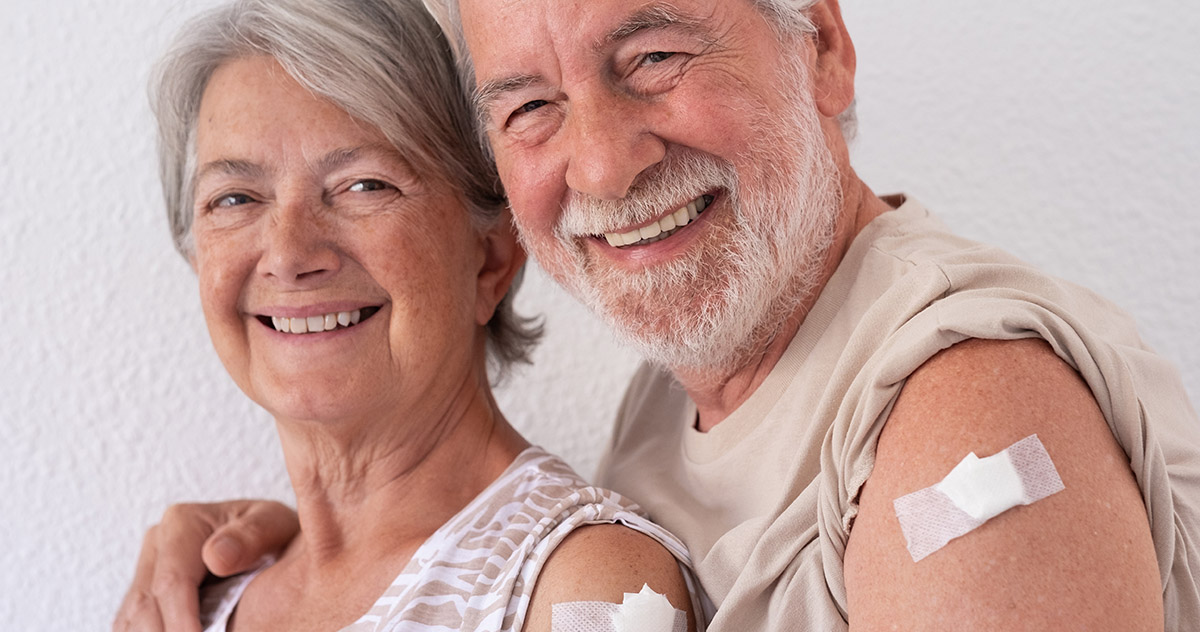What to Expect When Getting Your COVID-19 Vaccine
By Kristy Warren
The approval of safe, effective vaccines is a major milestone in our battle against Coronavirus COVID-19, made possible by unprecedented collaboration between scientists and clinicians around the world.

As the COVID-19 vaccine supply builds in the U.S. with the approval of another safe and effective vaccine, they will become available to more members of our community. Where do you fall in the vaccine rollout and what will it be like getting your COVID-19 vaccine?
In this two-part video feature, Wellsboro Laurel Health Center physician Dr. Guillermo Rodriguez tackles some common COVID-19 vaccine questions and walks you through what to expect when you get your shot. Learn about the vaccine phase categories, who's included in each, how the vaccine will help protect you and your loved ones, and why getting the vaccine is so important to getting our communities back to normal sooner.
PART ONE: ANSWERING YOUR COVID-19 VACCINE QUESTIONS
VACCINE SAFETY
The COVID-19 vaccines are FDA-approved for emergency use and have been repeatedly shown to be safe and effective through rigorous study and clinical trials. These vaccines were ready faster than most thanks to unprecedented collaboration between organizations and scientists around the world, but they were still subjected to all the same intensive safety trials.
Before being approved for use, the COVID-19 vaccines were:
- Rigorously studied and tested on thousands of volunteers to ensure safety and efficacy
- Reviewed in-depth by top clinical experts in the United States and around the world
- Vetted through all the same intensive clinical trials as every other vaccine
- Evaluated for safety for months ahead of approval and continue to be closely monitored
- Approved by the Food and Drug Administration (FDA) for emergency use because they met its rigorous criteria for quality, safety, and effectiveness. Emergency use authorization allows manufacturers to expediate the development and distribution of vaccines during a crisis like a global health pandemic to get help to people sooner.
Most people can safely receive the COVID-19 vaccine, and the research shows that the benefit of being vaccinated far outweighs the much greater risk of contracting COVID-19 and developing serious complications which can lead to chronic health problems, hospitalization, and death.
EFFICACY (HOW EFFECTIVE THE VACCINE IS)
The approved COVID-19 vaccines are very effective in preventing you from contracting COVID-19. Approximately 5-10% of those vaccinated may still get COVID-19 if exposed, but the COVID-19 vaccines teach your body how to more effectively fight the virus and greatly reduce your risk for severe symptoms, complications, hospitalization, or death if you become infected.
HOW IT WORKS
- The Pfizer and Moderna COVID-19 vaccines use two doses to teach your body how to fight the COVID-19 virus effectively; the first shot helps your immune system learn to recognize the virus, and the second shot strengthens your immune response
- The Janssen vaccine only requires one dose
- You cannot get COVID-19 from the shot as none of these authorized COVID-19 vaccines use the live virus that causes COVID-19
- It typically takes a few weeks for the body to build immunity after vaccination
UNDERSTANDING SIDE EFFECTS & WHAT THEY MEAN
- Side effects don’t mean a vaccine is unsafe but rather that it's working well by stimulating a strong immune response, a necessary part of building immunity
- Reported side effects for these vaccines are mild and temporary with most lasting just 1-3 days
- The most common side effects for the COVID-19 vaccine are similar to the flu shot: temporary pain where you received the shot, sore arm, fatigue, mild body aches, and headache
All medical care carries a chance of side effects and the benefits of being vaccinated and low risk of serious side effects far outweigh the much greater risk of contracting COVID-19. There have been no long-term serious side effects for the COVID-19 vaccines.
PART TWO: WHAT TO EXPECT WHEN GETTING THE VACCINE
UNDERSTANDING THE VACCINE ROLLOUT
Due to the current limited supply of vaccine, Pennsylvania has established a phased rollout plan that ensures the people most at risk for COVID-19 exposure and serious complications receive the vaccine first (e.g., healthcare workers, seniors, and those with underlying health conditions). The Laurel Health Centers have been working hard behind-the-scenes for months to prepare for the vaccine rollout and are partnering closely with local agencies to distribute vaccines as quickly and efficiently as possible.
The rollout is split into two main phases: phase 1 (people most at risk of exposure / complications) and phase 2 (the general public). Currently, Tioga County is working through Phase 1A. Below is a quick summary of the groups included in each phase; it is not an exhaustive list of who’s included, so please be sure to check the PA Dept. of Health website for full details:
- 1A: Healthcare workers, long-term care residents, seniors 65+, those aged 16-64 with high-risk chronic conditions like COPD, cancer, and kidney disease
- 1B: Frontline workers in grocery stores, public transit, manufacturing, agriculture, etc., people in congregate care settings, and individuals caring for those in daycare or adult daycare programs
- 1C: Industry workers in food service, construction, energy, public safety, transportation, etc.
- Phase 2: All other members of the general public aged 16 and up
Why 16 and up? Because the rigorous clinical safety trials for the two approved vaccines were studied in populations aged 16+ (16+ for Pfizer & 18+ for Moderna and Janssen). COVID-19 vaccination in children 15 and under is still being studied, and pediatric guidance will be issued once those studies have concluded.
To find your COVID-19 vaccine category and a full list of who is included in each phase, visit the PA Dept. of Health website at health.pa.gov.
WHAT TO EXPECT WHEN GETTING YOUR SHOT
Safety: Patients are screened ahead of receiving the vaccine to ensure it is appropriate for them. The COVID-19 vaccines are held to the same thorough testing and monitoring as all other vaccines. They have been rigorously tested through all stages of clinical trials on thousands of volunteers, reviewed in-depth by top clinical experts, and have been repeatedly demonstrated to be safe with no cases of severe long-lasting side effects during months of study. The research shows that the benefits of being vaccinated and the low risk of serious side effects far outweighs the much greater risk of contracting COVID-19 and developing serious complications, including long-term health issues and even death.

Scheduling: When it is your group’s turn to receive the vaccine, you’ll be screened to confirm you are eligible to safely receive the vaccine and if so, will be given an appointment and instructions on where to report.
Both you and the healthcare worker giving you the vaccine will be required to mask.
You may be asked to wait 15-20 minutes to watch for any signs of reaction, but be assured, serious side effects like allergic reaction are rare, and there have been no cases of severe long-term side effects in months of study.
Second dose: If you received one of the two-dose vaccines (Pfizer or Moderna), you will be scheduled for a return appointment for your second dose. It takes a few weeks to build immunity, and even after being vaccinated, you should continue to follow COVID-19 preventive measures like masking around others, washing your hands, avoiding large gatherings, and social distancing. Why? While the vaccines are highly effective, supply is currently limited, and this large-scale rollout will take time to complete. To end the need for the other preventive measures, the vaccines have to be successfully adminstered to a large enough population.
Understanding side effects: You may or may not experience mild side effects after getting the vaccine. This does not mean the vaccine is unsafe. In fact, side effects show it’s doing its job: promoting a strong immune response to teach your body how to successfully fight off COVID-19. The most common side effects for the COVID-19 vaccine are mild and resolve quickly: temporary pain at the injection site, sore arm, headache, and fatigue.
These side effects do not mean you have COVID-19. You cannot get COVID-19 from the shot as none of the approved vaccines contain the live COVID-19 virus. Serious side effects like allergic reaction are rare. All medical treatment—be it a vaccine, surgery, prescription, or lifestyle change—can have side effects. Knowing what to expect and keeping in mind the benefit-to-risk ratio can make you feel more confident and prepared.
Remain vigilant: After receiving your vaccine, it is still critical to continue utilizing all COVID-19 preventive measures, including masking, social distancing, disinfecting commonly touched surfaces / objects, and frequent handwashing. For now, it’s important that everyone, including those who have been vaccinated or have recovered from COVID-19, continue using all these preventive tools to protect themselves and others until the vaccine can be administered widely.
The Laurel Health Centers will keep you fully informed on our progress through the vaccination phases and any updates to our scheduling process via our social media and our news page. We are currently scheduling patients in Phase 1A, including those who are 65+ and with high-risk underlying conditions.
If you are in Phase 1A and would like to schedule a COVID-19 vaccine appointment with the Laurel Health Centers, call 1-833-LAURELHC (1-833-528-7354) or click here to use our online COVID-19 registration form.
